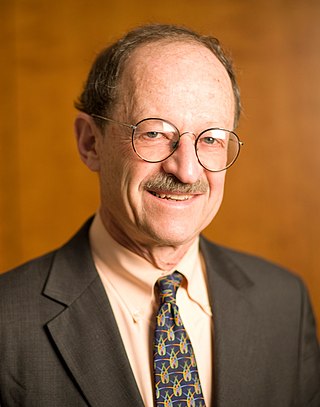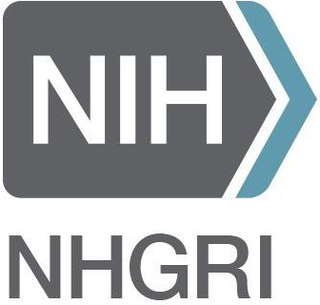
The Rockefeller University is a private biomedical research and graduate-only university in New York City, New York. It focuses primarily on the biological and medical sciences and provides doctoral and postdoctoral education. It is classified among "R2: Doctoral Universities – High research activity." Rockefeller is the oldest biomedical research institute in the United States.

Harold Eliot Varmus is an American Nobel Prize-winning scientist. He is currently the Lewis Thomas University Professor of Medicine at Weill Cornell Medicine and a senior associate at the New York Genome Center.

Memorial Sloan Kettering Cancer Center is a cancer treatment and research institution in Manhattan in New York City. It was founded in 1884 as the New York Cancer Hospital. MSKCC is one of 52 National Cancer Institute–designated Comprehensive Cancer Centers. It had already been renamed and relocated, to its present site, when the Sloan-Kettering Institute for Cancer Research was founded in 1945, and built adjacent to the hospital. The two medical entities formally coordinated their operations in 1960, and formally merged as a single entity in 1980. Its main campus is located at 1275 York Avenue between 67th and 68th Streets in Manhattan.

The National Human Genome Research Institute (NHGRI) is an institute of the National Institutes of Health, located in Bethesda, Maryland.
Tom Maniatis, is an American professor of molecular and cellular biology. He is a professor at Columbia University, and serves as the Scientific Director and CEO of the New York Genome Center.
The University of Maryland School of Medicine, located in Baltimore City, Maryland, U.S., is the medical school of the University of Maryland, Baltimore and is affiliated with the University of Maryland Medical Center and Medical System. Established in 1807 as the College of Medicine of Maryland, it is the first public and the fifth oldest medical school in the United States. UMB SOM's campus includes Davidge Hall, which was built in 1812, and is the oldest building in continuous use for medical education in the Northern Hemisphere.

The Eli and Edythe L. Broad Institute of MIT and Harvard, often referred to as the Broad Institute, is a biomedical and genomic research center located in Cambridge, Massachusetts, United States. The institute is independently governed and supported as a 501(c)(3) nonprofit research organization under the name Broad Institute Inc., and it partners with the Massachusetts Institute of Technology, Harvard University, and the five Harvard teaching hospitals.

The Weill Cornell Graduate School of Medical Sciences (WCGS) is a graduate college of Cornell University that was founded in 1952 as an academic partnership between two major medical institutions in New York City: the Weill Cornell Medical College and the Sloan Kettering Institute. Cornell is involved in the Tri-Institutional MD-PhD Program with Rockefeller University and the Sloan Kettering Institute; each of these three institutions is part of a large biomedical center extending along York Avenue between 65th and 72nd Streets on the Upper East Side of Manhattan.

The Jackson Laboratory is an independent, non-profit biomedical research institution which was founded by Clarence Cook Little in 1929. It employs over 3,000 employees in Bar Harbor, Maine; Sacramento, California; Farmington, Connecticut; Shanghai, China; and Yokohama, Japan. The institution is a National Cancer Institute-designated Cancer Center and has NIH Centers of Excellence in aging and systems genetics. The stated mission of The Jackson Laboratory is "to discover the genetic basis for preventing, treating and curing human diseases, and to enable research and education for the global biomedical community."

The Joan & Sanford I. Weill Medical College of Cornell University is Cornell University's biomedical research unit and medical school in New York City. It is affiliated with NewYork-Presbyterian Hospital, Weill Cornell Medical Center, Hospital for Special Surgery, Memorial Sloan Kettering Cancer Center, and Rockefeller University, all of which are located on or near York Avenue and Sutton Place.

The Tri-Institutional MD–PhD Program is an academic program of study based in New York City that was formed by combining earlier MD–PhD programs that had their inceptions in 1972. The current version of the program, which is operated by Weill Cornell Medicine, Rockefeller University, and Memorial Sloan Kettering Cancer Center's Sloan Kettering Institute, was created in 1991.
The Tri-Institutional Training Program in Computational Biology and Medicine or Tri-I CBM is a PhD program that exists as a partnership between the Weill Cornell Medical College (WMC), Rockefeller University, and Memorial Sloan-Kettering Cancer Center (MSKCC). The program is in part designed to encourage collaboration and a sense of connectedness between the two branches of Cornell University and the other institutions in Manhattan. Dr. Christina Leslie is the current director of the program.
The International Cancer Genome Consortium (ICGC) is a voluntary scientific organization that provides a forum for collaboration among the world's leading cancer and genomic researchers. The ICGC was launched in 2008 to coordinate large-scale cancer genome studies in tumours from 50 cancer types and/or subtypes that are of main importance across the globe.

Robert Bernard Darnell is an American neurooncologist and neuroscientist, founding director and former CEO of the New York Genome Center, the Robert and Harriet Heilbrunn Professor of Cancer Biology at The Rockefeller University, and an Investigator of the Howard Hughes Medical Institute. His research into rare autoimmune brain diseases led to the invention of the HITS-CLIP method to study RNA regulation, and he is developing ways to explore the regulatory portions—known as the "dark matter"—of the human genome.

Titia de Lange is the Director of the Anderson Center for Cancer Research, the Leon Hess professor and the head of Laboratory Cell Biology and Genetics at Rockefeller University.

Genomics England is a British company set up and owned by the United Kingdom Department of Health and Social Care to run the 100,000 Genomes Project. The project aimed in 2014 to sequence 100,000 genomes from NHS patients with a rare disease and their families, and patients with cancer. An infectious disease strand is being led by Public Health England.
Lorenz Studer is a Swiss biologist. He is the founder and director of the Center for Stem Cell Biology at Memorial-Sloan Kettering Cancer Center in New York City. He is a developmental biologist and neuroscientist who is pioneering the generation of midbrain dopamine neurons for transplantation and clinical applications. His expertise in cell engineering spans a wide range of cells/tissues within the nervous system geared toward disease modeling and exploring cell replacement therapy. Currently, he is a member of the Developmental Biology Program and Department of Neurosurgery at Memorial Sloan-Kettering Cancer Center and a Professor of Neuroscience at Weill Cornell Medical College in New York City, NY.

Elaine Ann Ostrander is an American geneticist at the National Human Genome Research Institute (NHGRI) of the National Institutes of Health (NIH) in Bethesda, Maryland. She holds a number of professional academic appointments, currently serving as Distinguished and Senior Investigator and head of the NHGRI Section of Comparative Genomics; and Chief of the Cancer Genetics and Comparative Genomics Branch. She is known for her research on prostate cancer susceptibility in humans and for conducting genetic investigations with the Canis familiaris —the domestic dog— model, which she has used to study disease susceptibility and frequency and other aspects of natural variation across mammals. In 2007, her laboratory showed that much of the variation in body size of domestic dogs is due to sequence changes in a single gene encoding a growth-promoting protein.
Agata Smogorzewska is a Polish-born scientist. She is an associate professor at Rockefeller University, heading the Laboratory of Genome Maintenance. Her work primarily focuses on DNA interstrand crosslink repair and the diseases resulting from deficiencies in this repair pathway, including Fanconi anemia and karyomegalic interstitial nephritis.
Christopher E. Mason is a professor of Genomics, Physiology, and Biophysics at Weill Cornell Medicine. He is also one of the founding Directors of the WorldQuant Initiative for Quantitative Prediction together with Olivier Elemento.













